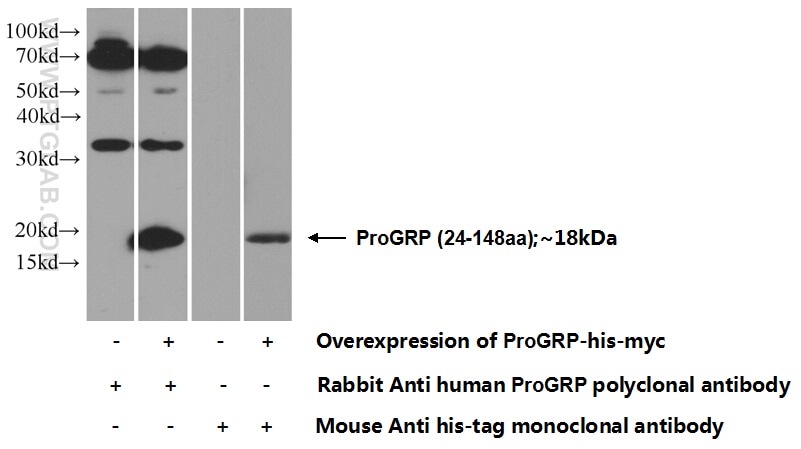Validation Data Gallery
Tested Applications
Recommended dilution
| Application | Dilution |
|---|---|
| It is recommended that this reagent should be titrated in each testing system to obtain optimal results. | |
| Sample-dependent, Check data in validation data gallery. | |
Published Applications
| IHC | See 1 publications below |
Product Information
14646-1-AP targets ProGRP in IHC, ELISA applications and shows reactivity with human samples.
| Tested Reactivity | human |
| Cited Reactivity | chimpanzee |
| Host / Isotype | Rabbit / IgG |
| Class | Polyclonal |
| Type | Antibody |
| Immunogen | ProGRP fusion protein Ag6239 相同性解析による交差性が予測される生物種 |
| Full Name | gastrin-releasing peptide |
| Calculated molecular weight | 16 kDa |
| GenBank accession number | BC004488 |
| Gene Symbol | GRP |
| Gene ID (NCBI) | 2922 |
| Conjugate | Unconjugated |
| Form | Liquid |
| Purification Method | Antigen affinity purification |
| UNIPROT ID | P07492 |
| Storage Buffer | PBS with 0.02% sodium azide and 50% glycerol , pH 7.3 |
| Storage Conditions | Store at -20°C. Stable for one year after shipment. Aliquoting is unnecessary for -20oC storage. |
Background Information
Gastrin-releasing peptide, also known as GRP, is normally formed by mucosal cells in the gastric antrum and by the D cells of the pancreatic islets, and its main function is to stimulate secretion of HCl by the gastric mucosa. HCl, in turn, inhibits gastrin formation. Its 148-amino acid preproprotein, following cleavage of a signal peptide, is further processed to produce either the 27-amino acid gastrin-releasing peptide or the 10-amino acid neuromedin C. These smaller peptides regulate numerous functions of the gastrointestinal and central nervous systems, including release of gastrointestinal hormones, smooth muscle cell contraction, and epithelial cell proliferation.These peptides are also likely to play a role in human cancers of the lung, colon, stomach, pancreas, breast, and prostate.
Publications
| Species | Application | Title |
|---|---|---|
Brain Struct Funct The von Economo neurons in frontoinsular and anterior cingulate cortex in great apes and humans. |
